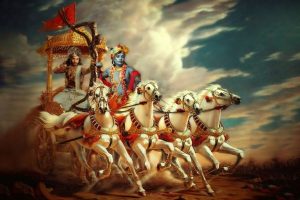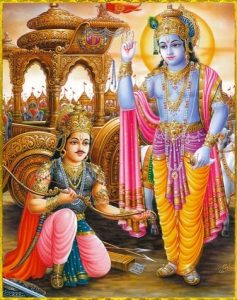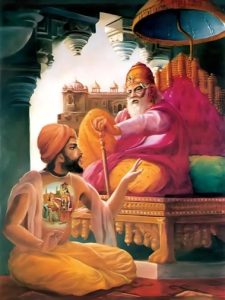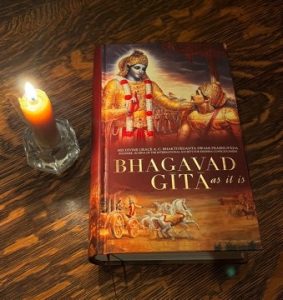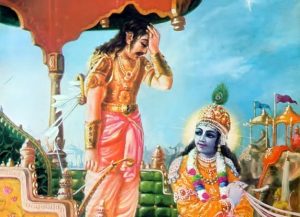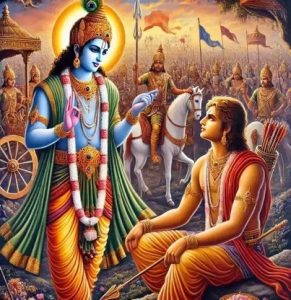By Nirooshitha Sethuram, Yogaratna
Graphics by Sheralee (Shambhavi) Hancherow
In Kurukshetra, Yudhishtra was looking at the massive army of the Kauravas, who were so ready to fight them.
He called upon Arjuna, saying, “The strength of the Kauravas is much more than ours, so we have to form our army in the needle point formation. This way, we can focus in a concentrated form, not spreading out in smaller numbers. This will prevent the attack of the enemy.”
Hearing this, Arjuna wanted to have a good look at the warriors who came to fight against them on behalf of the Kauravas. He told Krishna, who had offered to be his charioteer. Krishna drove the chariot, stopping it right in front of Grandsire Bhishma, Guru Drona and the Kauravas.
Arjuna was seeing his beloved, glorious Grandsire Bhishma, whom Arjuna respected and loved, along with his honorable Guru Drona, who was worthy of his reverence. Arjuna’s mind was confused. Doubt arose about his decisions to fight them.
He couldn’t take up arms against these great warriors who were worthy of his worship. The thought of killing loved ones in order to gain victory in the war shook his core. His heart was totally disturbed. He started questioning himself.
“Is it righteousness to battle with those who I always held in high esteem and devotion? Wouldn’t it be a great sin to kill those who are relatives, who we loved so much? Even if I attain victory by killing them all, what would I gain from such a conquest? This would be against all my core beliefs.
“I cannot do this. This is not right,” he said to himself. The Gandiva, Arjuna’s divine bow slipped from his hands. He got down to his knees and expressed his dilemma to his true friend and mentor Krishna.
Seeing Arjuna giving up his bow and sensing his inner conflict, in the middle of the battlefield Krishna spoke words to calm him down. Giving the teachings to Arjuna at that crucial moment, his divine dialog became eternalized as Bhagavad Gita, the Song of God.
The Bhagavad Gita is comprised of 701 shlokas (verses). These shlokas have been organized into eighteen chapters. The Bhagavad Gita is one of the best-known philosophical texts of Hinduism. It is said to contain the essence of the ponderous four Vedas and the 108 Upanishads.
The eighteen chapters are classified as ‘Yogas.’ The entire knowledge of the universe is packed into the Bhagavad Gita. It is supremely profound content, expressed in revealing language of comforting beauty and simplicity. The Bhagavad Gita can be understood and applied in all fields of human endeavor and spiritual striving, regardless of their disparate natures and needs. For those on their spiritual journey, the Bhagavad Gita sheds its light there.
Many classical and modern intellectuals have written commentaries on the Bhagavad Gita. Some classical commentaries are by acharyas such as Adi Shankara, Bhaskara, Abhinavagupta, Ramanuja and Madhvacharya. The oldest and most influential surviving commentary is by Adi Shankara.
The Bhagavad Gita is a record of the conversation between Arjuna and Krishna. It was being narrated to King Dhritarashtra by Sanjaya, who had been blessed by Sage Vyasa to have distant vision of the battlefield.
The Bhagavad Gita is one spiritual text everyone should be familiar with. Here we will provide a bite-size summary, condensing the essence of the Bhagavad Gita and the gist of its central themes. The purpose is to share the completeness of Krishna Avatar, as these teachings were given to us by Krishna himself. This compilation is based on a few English translations of the text.
The following are the eighteen chapters in the Bhagavad Gita.
Chapter 1: Arjuna Viṣhāda Yoga — The Yoga of the Despondency of Arjuna
Chapter 2: Sankhya Yoga — The Yoga of Knowledge
Chapter 3: Karma Yoga — The Yoga of Action
Chapter 4: Jñana Yoga — The Yoga of Wisdom
Chapter 5: Karma Sanyāsa Yoga — The Yoga of Renunciation of Action
Chapter 6: Dhyāna Yoga — The Yoga of Meditation
Chapter 7: Vijñana Yoga — The Yoga of Realization
Chapter 8: Akṣhara Parabrahma Yoga — The Yoga of the Imperishable Brahman
Chapter 9: Rāja Vidyā Yoga — The Yoga of the Kingly Science
Chapter 10: Vibhūti Yoga — The Yoga of the Divine Glories
Chapter 11: Viśhwarūpa Sandarśhana Yoga — The Yoga of the Vision of the Divine Form
Chapter 12: Bhakti Yoga — The Yoga of Devotion
Chapter 13: Kṣhetra Kṣhetrajña Vibhāga Yoga — The Yoga of the Field & the Knower of the Field
Chapter 14: Guṇa Traya Vibhāga Yoga — The Yoga of the Three Gunas
Chapter 15: Puruṣhottama Yoga — The Yoga of the Supreme Spirit
Chapter 16: Daivāsura Sampad Vibhāga Yoga — The Yoga of the Divine and the Demoniacal
Chapter 17: Śhraddhā Traya Vibhāga Yoga — The Yoga of the Threefold Faith
Chapter 18: Mokṣha Sanyāsa Yoga — The Yoga of Liberation by Renunciation
Let’s begin by looking at each chapter with a little bit of detail.
Chapter 1: Arjuna Viṣhāda Yoga — The Yoga of the Despondency of Arjuna
The first chapter describes the warriors of the two armies as well as the sounding of the conch signaling their readiness for war. It also describes Arjuna surveying both the armies.
Nearly half of the chapter is about Arjuna’s misery. His mind leaning toward attachment gives him overwhelming grief about the atrocious task he is about to undertake. His misconception stems from his spiritual ignorance.
The Dialog
Arjuna says, “O Krishna, at the sight of these kinsmen, assembled here eager to fight, my limbs fail, my body is shaken, and my bow Gandiva slips from my hand. I cannot hold myself steady. I see signs of evil. I do not desire victory or kingdom or pleasures. What joy can be ours by killing these sons of Dhritarashtra and fathers, grand-fathers, teachers, uncles, brothers, sons, grandsons, companions, fathers-in-law, and friends? We have decided to commit a great sin where we are ready to slay our own family to satisfy our greed for the pleasure of a kingdom! I feel it will be far better for me if the sons of Dhritarashtra slay me in the battle, unarmed and unresisting.”
Chapter 2: Sankhya Yoga — The Yoga of Knowledge
Arjuna expresses the depth of his problem and surrenders to his friend and mentor, Krishna. Krishna explains the highest knowledge about the nature of Atma, the immortal Self, and the impermanence of all other things, including the body and the world.
He describes the necessity to fight the battle according to Kshatriya Dharma, and the principle of action without motive. Krishna stresses the importance of doing one’s duty, and the way to be a true Karma Yogi.
The Dialog
Krishna says, “O Arjuna! In this critical situation, why has this mental misery taken hold of you? Do not yield to weakness. It does not befit you. Arise, the scorcher of enemies!”
Arjuna says, “Bhishma and Drona are my teachers, fit to be worshipped. How can I attack them? My mind is confused and I am ignorant of what my duty is. So I ask you to teach me what is good for me. I am your disciple. I take refuge in you.”
Krishna says, “Never was there a time when I, you, nor these kings and men, did not exist. Never will there be a time hereafter when any of us shall cease to exist. The firm man who is not affected by anything is surely fit for immortality.
Arjuna, know that Atma is indestructible and pervades the whole universe. No one can cause the destruction of the imperishable. Atma is not born, nor does Atma ever die. Just as a man throws their worn-out clothes and puts on new ones, Atma throws away its worn-out bodies and takes other fresh bodies.
Weapons cannot cut, fire cannot burn, water cannot wet, wind cannot dry up Atma. You should not waver in doing your own duty. There is nothing higher for a Kshatriya than a righteous war. Have a mind that sees pain and pleasure, gain and loss, victory and defeat, likes and dislikes, in the same way, thus you engage in battle. Thereby you will not acquire any sin.”
Krishna continues, “Now hear the knowledge of Karma Yoga. By knowing this, you can cast off the bondage of work. You have the right to the work you do, not to the fruits of your work. Don’t let the fruits of action be your motive, nor be attached to inaction. Steadfast in Yoga, give up all attachments. Treating success and failure the same, do your job. Such level-headedness of mind is called Yoga. When your intellect becomes steady and resolute in interior concentration, you will attain union with the Supreme or Superconscious.”
Arjuna asks, “What are the characteristics of a man of steady wisdom, who has merged in the Superconscious?”
Krishna says, “As a man looks at sense-objects, he creates attachment for them. From attachment, desire for them arises. From desire arises anger, anger goes into delusion, from delusion comes loss of memory. From loss of memory comes destruction of discernment, and from destruction of discernment he succumbs.
When a man renounces completely all the desires of the mind, fully satisfied with his mind fixed in Atma, then he is declared to be a man of steady wisdom. When a man has no attachment to anything anywhere, and does not rejoice or hate when good or bad things happen, his wisdom is steady.
Having restrained all the senses, he sits steadfast, focused on Me. Whose senses are under control, his wisdom is steady and he attains peace. By peace and virtue, his mind is soon fixed in the Self. The man who lives completely free from desires, and without yearning, devoid of the sense of “I” and “mine,” attains peace. Having obtained this Brahman state, man is not deluded. Being established in this, even at the end of life, man attains oneness with Brahman.”
More to come…
- Arjuna & Krishna https://in.pinterest.com/pin/618119117631184893
- Arjuna giving up bow to Krishna https://ca.pinterest.com/pin/374502525245380340
- Sanjaya & King Dhritarashtra https://spiritmeaning.org/dhritarashtra-unstoppable-kaliyuga-catalyst
- Bhagavad Gita book Photo by S.Hancherow
- Arjuna in despair with Krishna https://krishna.org/arjunas-bewilderment
- Krishna explaining Atma to Arjuna https://timeslife.com/life-hacks/aatma-unborn-undying-eternal-truth-bhagavad-gita/articleshow/117561441.html
- Union with the Supreme, Superconscious https://www.facebook.com/photo/?fbid=518899540241128&set=a.518899496907799

